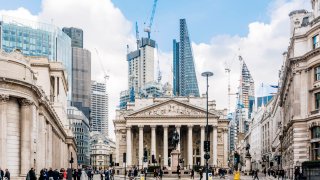
- The Bank of England revealed on Thursday that British banks would need a minimum of six months to prepare for the introduction of a negative interest rate regime, though it clarified this did not mean that further rate cuts were imminent.
- Since the onset of the coronavirus pandemic, the Bank of England has cut its main lending rate from 0.75% to 0.1%. It left it unchanged at its policy meeting Thursday, along with maintaining its target stock of asset purchases at £895 billion ($1.2 trillion).
The U.K. is in a "different place" to continental Europe with regards to the need for negative interest rates, Bank of England Deputy Governor Ben Broadbent has told CNBC.
His comments came after the Bank of England revealed that British banks would need a minimum of six months to prepare for the introduction of a negative interest rate regime, though it clarified this did not mean that further rate cuts were imminent.
Negative rates effectively pay businesses and individuals to borrow money and penalize banks for depositing cash, in theory encouraging them to invest and spend more which can help the economy to grow. However, they exert further downward pressure on banks' profit margins, which if passed on to customers, could fail to have the desired effect.
In a letter to lenders published Thursday, Sam Woods, the head of the Bank's Prudential Regulation Authority, said a majority of banks would need time to alter systems and processes and implement strategic or tactical solutions.
Broadbent told CNBC's "Street Signs Europe" on Friday that this would be similar to the preparation embarked upon euro zone banks in 2014 before the European Central Bank took interest rates below zero for the first time.
Money Report
"We have been at least in a slightly different place from the ECB, which found itself in 2014 having already had a long period of inflation below target, and indeed inflation expectations dropping below target, and we have not been in that position," Broadbent said, adding that the bank deemed its current monetary policy "appropriate."
Since the onset of the coronavirus pandemic, the Bank of England has cut its main lending rate from 0.75% to 0.1%. It left it unchanged at its policy meeting Thursday, along with maintaining its target stock of asset purchases at £895 billion ($1.2 trillion).
Negative rates 'unlikely'
Despite speculation of negative rates, several analysts have suggested that the central bank may not need to loosen policy any further in the foreseeable future.
Gurpreet Gill, macro strategist for global fixed income at Goldman Sachs Asset Management, said the BOE's engagement with banks to explore the feasibility of negative rates should not be interpreted as an imminent policy signal, and suggested such a move is unlikely in 2021.
"Secondly, from a broader macro standpoint we don't regard negative rates — which could adversely impact the banking sector — as an effective tool for downturn periods, even if they are accompanied by a tiered system of reserve remuneration," Gill added.
She also noted that no central bank that entered the Covid crisis with negative rates has delved further below zero.
"Central banks that haven't yet ventured into negative rates may not wish to do so in this environment, at least not until the economic recovery is on more solid footing," she added.
ING Developed Markets Economist James Smith said the standout message from the Bank of England was that its Monetary Policy Committee had "limited enthusiasm" for negative rates. He noted that the meeting minutes published Thursday contained several references to the fact that the news was not a signal that sub-zero rates were forthcoming.
"The Bank's latest forecasts make it clear policymakers don't see the need for further stimulus. Its projections now assume the economy will regain all lost ground by the fourth quarter, and that unemployment will only be marginally higher at this point next year," Smith said in an emailed comment Thursday.
"Inflation is expected to be a little above target for the next couple of years. While some of that in our view may turn out to be a little optimistic, the signal implies that neither a rate cut nor a further expansion in quantitative easing beyond this year is likely, if the Covid-19 story goes as hoped."
The U.K. is expected to have vaccinated 15 million people in its top four priority groups by mid-February, with vaccines being distributed at a pace that has drawn widespread acclaim.
Vivek Paul, U.K. chief investment strategist at BlackRock Investment Institute, said interest rates have likely entered a "new nominal" in which they remain "rangebound" for some time, owing to material impediments to significant moves higher or lower.
"Indeed, even once we are through the worst of the crisis - and as the vaccine rollout enables a more widespread economic recovery — there will be greater barriers to rates rising due to the heightened sensitivity of government debt servicing costs to rate rises and the increasing willingness of central banks across the globe to look through temporary inflation overshoots," Paul said.
He added that given the pace of vaccine distribution, current policy support should be able to provide a bridge to either spring or summer for an emergence from the pandemic.
"Now, with all eyes on the path of the recovery and with the uncertainty of a no-deal Brexit firmly in the rear-view mirror, we see internationally focused U.K. large-cap stocks as an attractive proposition on valuation grounds and a route to accessing the global post-Covid recovery story," he concluded.






